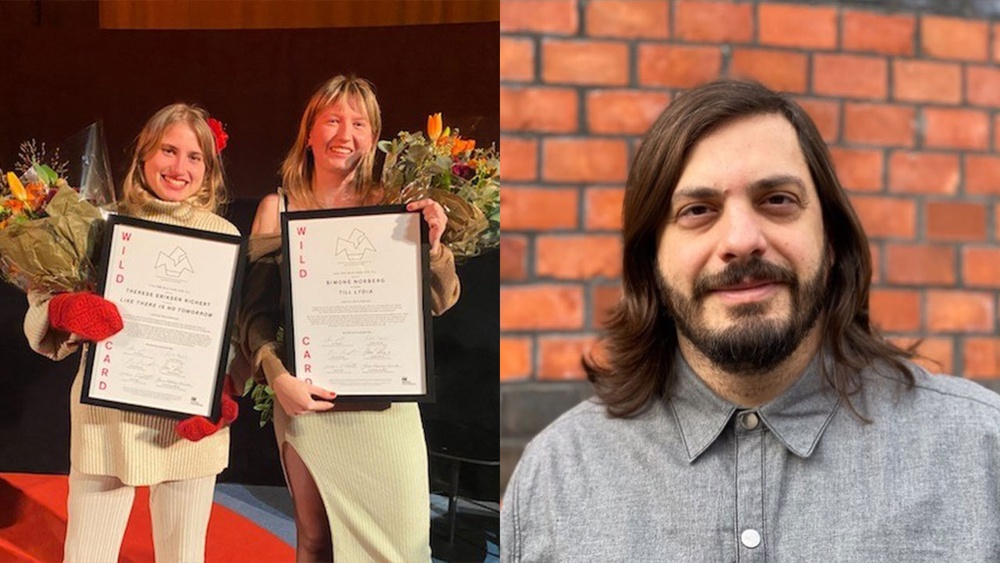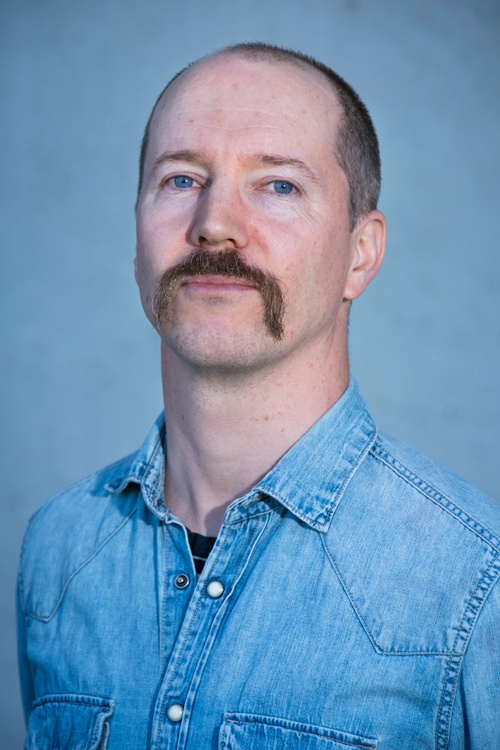Wild Card – meet the newest stars of Swedish film
 Happy Wild Card winners at Filmhuset Tess Quatri and Simone Norberg. Vangelis Kollias also wins Wild Card. Photo: Linus Andersson. Vangelis Kollias, photo: Giorgos Fotiou
Happy Wild Card winners at Filmhuset Tess Quatri and Simone Norberg. Vangelis Kollias also wins Wild Card. Photo: Linus Andersson. Vangelis Kollias, photo: Giorgos FotiouThe newly graduated directors Simone Norberg, Tess Quatri and Vangelis Kollias have been selected for the Swedish Film Institute's initiative Wild Card. They will share SEK 1.2 million to develop individual feature film projects.
The purpose of Wild Card is for the Film Institute to encourage unique voices of the new generation, and to give new directors a chance to get started quickly after graduation. The directors have applied with their graduation film project and a show & tell (3 min moving material) where they present their new feature film idea. The jury for fiction film has consisted of the Film Institute's talent manager and the film commissioners for fiction: children and young people, short films and new formats, feature films and Moving Sweden. The documentary jury has consisted of the film commissioners for documentary film and two controllers.
At a ceremony in Filmhuset, Stockholm yesterday evening, during Stockholm International Film Festival, the three winners were presented with SEK 400,000 each. The prize enables the creation of a pilot for a feature film, as well as idea, project, and script development.
Simone Norberg for the film Till Lydia (International title tba)
Synopsis
22-year-old Hanna develops a secret relationship with her best friend Lydia´s ex-boyfriend Oliver. Over the course of a warm summer in Gothenburg city, the audience gets to follow how she slowly and unavoidably loses them both.
The jury’s motivation
This director has a unique and narrative voice that impresses the jury. In both her graduation film and her previous short films, she has captured interpersonal relationships with great authenticity and intuition. Through a mature eye and beautiful work, she brings multiple layers and complexity into seemingly simple stories. The director has teamed up with two brilliant and promising production stars who will strengthen the upcoming feature film with their experience of developing and producing interesting and innovative projects. The director applies with a project that digs even deeper into subjects she has explored earlier. With clear vision, the audience gets to follow and come close to a lead female character who is so very human but with an edge that makes her exciting. At the same time, the jury is not sure if they´d want her as a friend.
– It feels fantastic, of course. Also it´s such a prestigious start for this project and life after school. It´s going to be so much fun to get started! says Simone Norberg.
Simone Norberg holds a bachelor´s degree in film directing from HDK-Valand Academy of Gothenburg. She has a background in the art world and has also attended the film program at Fridhem folk high school. As a director she mainly works with fiction and drama, often focusing on themes of friendship, relationships and being young adult in modern time. Simone´s biggest passion is collaborating with actors.
Till Lydia is produced by Stina Eriksson and Alicia Hansen for Prolaps Produktion.
Tess Quatri for the film Like There Is No Tomorrow
Synopsis
When 25-year-old Frida gets caught occupying the apartments and houses of the wealthy tourists staying at her hometown Arguineguin, she finds herself hiding for the illegal organizations that gets rid of Spanish squatters on behalf of the tourists. She moves in with her mother in a caravan village on the outskirts of Arguineguin; a ghetto-like place for locals who can no longer afford to pay rent for normal housing. Once there, she meets a bulldozer and a man who´s plan is to eliminate the village in favor of yet another hotel being built on the property. Frida has to stay hidden at the same time she tries to save her village so that she won´t end up on the street, even if she´s not sure the village is worth saving.
The jury’s motivation
With her graduation film, the director has made good use of the film medium´s unique means of expression. Poetry combined with everyday feelings makes an imaginative story of two elderly women´s will to decide over their destiny. The director gets her inspiration from her own upbringing on a tourist island. The synopsis paints a rarely exposed world; an exciting and nasty portrait of a tourist resort where everybody party like it´s the last day on earth, told from the perspective of the locals. A world where we serve them. Them who behave like overgrown children, as if there was not tomorrow. It is a thought-provoking picture of a tourism vs imperialism and class. There is also a glimpse of a thematic regarding sustainability, portraited through a life that is anything else but sustainable. The jury looks forward to following three generations of women who grow up, live and work in a paradoxical circus – with swaying palm trees in the background.
– I am incredibly grateful to get the opportunity to make a pilot for my dream project Like There Is No Tomorrow. The film is based on real events that took place on the island of Gran Canaria few years ago, and with this Wild Card we are finally able to tell that story in the best possible way. Wild Card is great for new directors who have something they really want to express, but don´t know how and where to start, says Tess Quatri.
26-year-old Tess Quatri attended the film program at Fridhem folk high school before being accepted to the bachelor´s program in film directing at the The Norwegian Film School, graduating in the spring of 2022. Her graduation film Final Forever is a story about an elderly couple who in their pursuit for eternal life manages to build a space rocket and was first screened at Next Nordic Generation at the Norwegian Film Festival in Haugesund. Tess grew up in Sweden, Spain, Kenya and Norway. Her film Like There Is No Tomorrow takes place on the island where she grew up, Gran Canaria.
Vangelis Kollias for the film How to Say Goodbye
Synopsis
What happens when your feelings are repressed? Do you remember, can you? Long tradition and testosterone to the max, a separation and suddenly a crack on the reality. Are you the same? Are you man enough?
The jury’s motivation
In his graduation film, the director has drawn inspiration from widely different genres and cultures. The film has a tender, low-key humor where “being Swedish” as well as fumbling masculinity are examined. It is a personal story, about a beloved home that has been abandoned – conveyed in thought-through scenes. The result is an accurate realism meeting courage, irony and distance, with a clear eye for details of the visual language. The director possesses a unique voice, as well as a great sense of style.
– My intention is to scratch the thick surface of what we call “real men” and explore what is behind. To finally create space to think and express the sensitivity that the masculinity norm oppresses and hides, says Vangelis Kollias.
Vangelis Kollias is a practice-based filmmaker artist from Greece living and working in Sweden since 2012. In his work he explores the concepts of memory, time, belonging and sorrow. His method is a hybrid mix of fiction and documentary and he uses the self-performative mode as a tool to explore his cinematic questions. He holds a master’s degree in film from HDK-Valand Academy of Gothenburg. He was given the Mannheimers scholarship and selected to be part of the Nordic Talents pitch forum in Copenhagen 2022.
How to Say Goodbye is produced by Anna Byvald for Silver Films.
Previous year’s winner of Wild Card
2018 Fanny Ovesen, Ernst De Geer and Jerry Carlsson
2019 Amanda Björk, Jonathan Nikolaj Heinius and Nathalie Álvarez Mesén
2020 Sebastian Johansson Micci and Elsa Rosengren
2021 Angelika Abramovitch, Lina Vain Illalla and Loran Batti
For questions, contact
Hanna Sohlberg, film consultant for Moving Sweden at the Swedish Film Institute
hanna.sohlberg@filminstitutet.se
08-665 12 75
Lina Norberg Johansson, talent manager and controller at Production Support at the Swedish Film Institute
lina.norberg@filminstitutet.se
08-665 12 27
About The Swedish Film Institute
The Swedish Film Institute is a collective voice for film in Sweden, and a meeting-place for experiences and insights that elevate film on all levels. We preserve and make available Sweden’s film heritage, work to educate children and young people in film and moving images, support the production, distribution and screening of valuable film, and represent Swedish film internationally. A broad diversity of narratives establishes discussions and insights that strengthen the individual and our democracy. Together, we enable more people to create, experience and be enriched by film.
Contacts

Martin Frostberg
- martin.frostberg@filminstitutet.se
- +46(0)8 665 12 12
- +46(0) 70 348 93 33